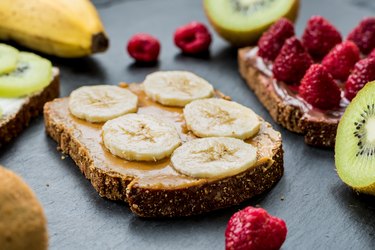
Whether you're doing intense cardio, yoga, HIIT or weight training, all forms of exercise require energy — and energy demands both attention and intention in regard to your food choices. Making an informed and educated decision on what to eat before a workout can impact the quality of your sweat session as well as your recovery.
The key to getting the most out of your workout begins by understanding the macronutrients (or macros) on a nutrition label, their functions within the body and how they relate to your overall performance. Finding consistent and sustainable patterns around exercise and the nutrition that supports optimal performance will motivate you and help you reach your training goals. Even if you find that you may not need to fuel up in advance, having the right type of energy readily available to your body can give your workout a major boost.
But what should you eat or drink before your workout? And when should you do it? Here's what you need to know to properly fuel your sweat sesh.
What to Eat Before a Workout
Carbohydrates, proteins and fats are needed in varying amounts based on age, body composition, gender and physical activity level to support your health and fitness progress. In line with the 2015-2020 Dietary Guidelines, your macros should be obtained from whole and minimally processed foods.
Ultra-processed foods that are an abundant source of lab-made fats, added sugars, preservatives and stabilizers are definitely not the ideal base for any high-quality eating pattern. (Think deli meats, candy bars and baked goods.) Not only are processed foods linked to weight gain and metabolic diseases, but they can make you sluggish and hinder your training routine.
Note that pre-workout needs vary based on the intensity, duration, type of physical activity as well as your individual goals. Light, moderate and intense workout sessions require different amounts of protein, fats and carbs as does weight loss versus weight maintenance. While carbs are your body's preferred energy source, you'll want to limit fiber and fat before a workout to prevent any distracting gastrointestinal issues.
Carbs
Timing is key when thinking about your macros. Carbohydrates — in the form of glucose, your body's primary source of energy — provide an easily digestible fuel source. Many athletes can relate to bonking because their blood glucose has dropped too low.
However, any unused glucose will be converted into glycogen and stored in the muscles and liver for future energy use, Jim White, RD and owner of Jim White Fitness and Nutrition Studios, tells us. "Glycogen is most often used for short, intense bouts of exercise, such as sprinting or weightlifting." Fun fact: It is believed that the main function of skeletal muscle glycogen, from an evolutional point of view, is to serve as an energy store in fight or flight situations.
Carbs can be found in dairy (in the form of lactose) as well as in plant-based foods. Non-starchy vegetables, starchy vegetables, whole grains and legumes are excellent plant-based sources of carbohydrates. If you're choosing dairy, go for a brand without added sugars, dyes and stabilizers.
Tip
If you're planning to eat one to four hours before a workout, have one to four grams of low-glycemic carbs per kilogram of body weight, a March 2016 paper in the Journal of the Academy of Nutrition and Dietetics tells us. So if you weigh 150 pounds, aim to get 70 grams to 270 grams of carbs before hitting the weight rack. You might be wondering why that range is so large. That's because the upper end of the spectrum is a target for avid athletes doing hard training while the average exerciser would find the lower end of the spectrum more appropriate.
Carbs that are lower on the glycemic index (GI) are preferred because they don't spike your blood sugar as drastically and are more slowly digested than high glycemic carbs. But if you need to fuel up immediately before a workout and you haven't eaten in a while, you'll need higher-glycemic carbs for immediate energy.
Protein
Proteins are widely distributed in both plant and animal-based sources and are a necessary building block for maintaining muscle and bone health.
Animal-based proteins provide all nine essential amino acids while plant-based proteins generally need to be combined from a variety of sources to yield a high-quality protein with all the essential amino acids. Amino acids are the building blocks of proteins and our muscle tissue is made of proteins, White tells us. "Our bodies need 20 different amino acids to grow and function properly but only nine amino acids are classified as essential — which means that they must be obtained via our diets since our bodies can't produce them on their own," White says. Plus, amino acids help synthesize hormones that help us to build muscle mass, regulate our sleep (which is paramount in recovery) and aid in energy regulation, which we need for great workouts!
So while you can rest assured you're getting all your essential amino acids when you're eating meat, it's important to note that vegetarian and vegan athletes can meet their protein needs by eating a diverse plant-based diet.
Read more: 5 Tips for Eating Protein the Right Way
Before your workout, aim for a meal or snack that contains 10 to 20 grams of protein, White recommends, adding that your meal or snack should contain at least 75 percent of total calories coming from carbs and no more than 25 percent coming from protein.
Throughout the day, aim for 1.2 to two grams of protein per kilogram of body weight each day to support exercise and recovery while improving muscle and protein synthesis. If your goal is weight loss, consume protein at the higher end of the range while having a structured weight management plan to preserve lean muscle.
Fats
While your pre-workout meal should focus on carbs and protein, eating small amounts of fat can help to control glycemic responses during exercise, according to an October 2008 paper in the Journal of the International Society of Sports Nutrition. And take note that dietary fats aren't the best choice to eat before a workout if you're doing short, high-intensity circuits like HIIT.
"Fat provides the main fuel source for long-duration, low- to moderate-intensity exercise such as marathons," White tells us. "Even during high-intensity exercise, where carbs are the main fuel source, fat is needed to help access the stored carbohydrate (glycogen)." If you're exercising for longer than 30 minutes, your body starts to burn fatty acids instead of glucose — and shifting away from glucose and glycogen allows the body to burn adipose tissue (the body's fat stores), White says. "During low-intensity exercise, glycogen breakdown is not markedly stimulated, so dietary fat serves as the chief energy source."
The key takeaway: If you're engaging in endurance exercise, you may benefit from some fat in your pre-workout meal or snack. Just don't overdo it with the cheese and avocado in order to avoid stomach upset.
Pre-Workout Meal Ideas and Why Timing Is Key

Your macros should also be based on your individual goals whether it be running a 5K or breaking your personal record in the weight room.
"If you're a marathon runner who wants to boost endurance, you should eat a large, carb-rich meal a few hours before a workout to build up glycogen stores and have long-lasting energy, says Natalie Rizzo, RD and author of The No-Brainer Nutrition Guide For Every Runner. Rizzo suggests a rice bowl with sweet potatoes and veggies. If you're engaging in a lower intensity workout, try a banana with a tablespoon of natural peanut butter. "This will still give you energy, but you don't need quite as many carbs and calories for a lower intensity workout," Rizzo recommends.
"It's important to have a pre-workout fueling plan because the timing of meals and the nutrients you eat before a workout can impact how you perform," Rizzo tells us. "As a rule of thumb, the best thing to eat before a workout is carbs, but the types of carbs depends on when you eat them.
For instance, if you can eat two to three hours before a workout, it's best to pair complex carbs with some protein, such as a turkey sandwich on whole-grain bread. This combination requires a few hours to digest and will give you long-lasting energy throughout your workout."
If you are having a snack within 30 minutes of working out, choose a carbohydrate that is readily digested such as a piece of fruit. Go for a banana, an apple or a cup of berries.
What about limiting calories? Vanessa Rissetto, RD, a dietitian based in NYC and Hoboken recommends having a pre-workout snack that doesn't exceed 200 calories, especially if your goal is weight loss.
"Choosing the wrong food before a workout, such as a heavy or greasy meal, can lead to indigestion and may hinder your performance," Rizzo says. Other common culprits of gastrointestinal distress are high-fiber foods that may cause gas and bloating as well as large, energy-dense snacks that take longer to digest — and are quite literally sitting in your digestive system as you exercise!
A well-planned snack that delivers a balance of healthy carbs and protein is just what you need to make it through a workout. "It should feel light on the stomach and shouldn't weigh you down," says DJ Blatner, RDN, a dietitian for the Chicago Cubs.
As with all of these recommendations, individualization is key — and once you've found a routine that works, stick with it as consistency is just as important!
Hydration Matters, Too
No pre-workout routine is complete without adequate hydration. Similar to macro needs, your individual hydration needs will vary as well. You should have about five to 10 milliliters of water per kilogram of body weight two to four hours before exercise, according to the March 2016 paper. So that means that a 150-pound person would need to drink 1.5 to 3 cups of water two to four hours prior to exercise. This window allows for both adequate hydration on a muscular and cellular level and enough time to excrete any excess fluid.
Read more: The 5 Best Preworkout Supplements and 4 to Avoid
Working out in warmer and more humid climates as well as longer workout will require you to drink more water to compensate extra sweat — so remember to drink up before and during your sweat session!